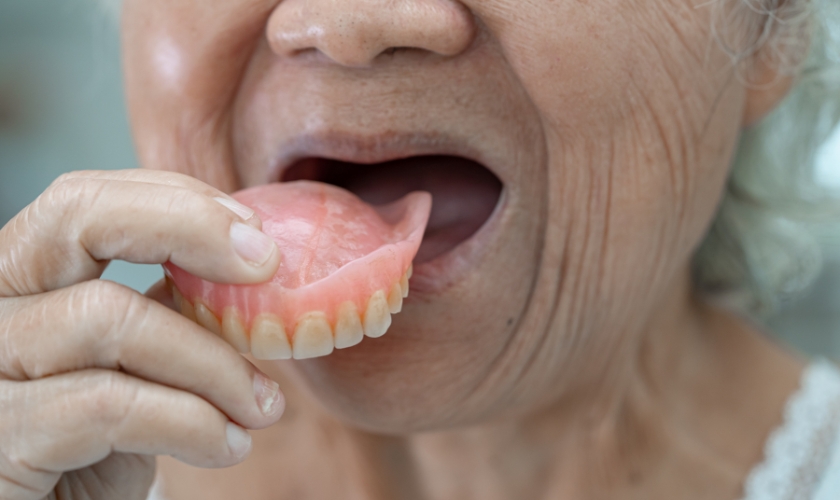How to Speak Clearly With Dentures: Easy Exercises That Work


Wearing dentures for the first time can feel like learning how to talk all over again. You’re not imagining things—your tongue, lips, and cheeks do need time to adjust. Slurred speech, whistling sounds, or unintentional lisps can all show up early on. Fortunately, these are common issues—and dentists agree that with a little practice, you can speak clearly and confidently again.
If you’re new to dentures and wondering how long does it take to get dentures, the process typically ranges from a few weeks to a couple of months, depending on whether extractions or healing are needed. Once they’re placed, adjusting to them—including speech—takes just a bit more time and practice.
Why Is Speaking With Dentures So Tricky?
Before jumping into the exercises, it helps to understand what’s happening in your mouth. Dentures don’t have the exact same feel as your natural teeth. The shape, texture, and placement are different. That means your tongue and lips have to “relearn” how to form words.
Some sounds may come out unclear or muffled. Dentures may also shift while talking—especially in the early days—making it harder to enunciate. But according to ADA dentists, these issues are temporary and can be resolved with targeted exercises.
Start with Simple Warm-Ups for the Mouth
Just like stretching before a workout, warming up your mouth muscles can make a big difference in how you speak with dentures.
1. Lip Stretches and Smiles
Open your mouth wide like you’re yawning, then purse your lips as if blowing a kiss. Repeat the same movements 10 times. Follow up with a big smile, holding it for 5 seconds. These facial movements improve flexibility and support clear pronunciation.
2. Tongue Pushes
Dental professionals often recommend strengthening the tongue for better speech control. Push your tongue to the roof of your mouth and then press against each cheek. Try “drawing” letters or numbers with your tongue. It’s a simple, dentist-recommended exercise that works surprisingly well.
3. Cheek Puffing
This might look funny in the mirror, but it works. Puff one cheek, then the other, holding each side for a few seconds. This builds strength in the buccinator muscles that help keep dentures steady during speech.
Read Aloud to Train Your Tongue
Reading aloud is one of the best things you can do for strong dentures. Specialists in denture care suggest reading for at least 10–15 minutes a day. Focus on slow, deliberate pronunciation.
Don’t worry if you sound robotic at first. The goal is clarity, not speed. With repetition, your tongue and lips will begin to fall into the right rhythm, just like they did with your natural teeth.
Focus on Tricky Sounds
Some letters are harder to pronounce when you’re new to dentures. “S,” “F,” “Sh,” and “Th” are the most common troublemakers. Practicing words with these sounds helps build accuracy and confidence.
Practice Sentences for “S” Sounds:
- “Sally sells sea shells by the seashore.”
- “Seven slippery snails slid slowly seaward.”
For “F” and “V” Sounds:
- “Fred’s five frogs found fresh flies.”
- “Victor viewed the velvet vase.”
For “Th” and “Sh”:
- “The thief threw three thick things.”
- “She should show some short shapes.”
These are more than tongue twisters—they’re training tools, and dentists often recommend them to improve speech while adapting to dentures.
Use a Mirror for Feedback
Dentists often suggest using a mirror while practicing speaking. Watching your lip and tongue movements helps you identify what’s working and what needs adjustment. Plus, it builds awareness and confidence.
You’ll start to notice your improvements faster when you can see them, not just hear them.
Bite and Swallow Practice
This tip comes straight from denture specialists: Bite down gently and swallow before speaking. This action helps “seat” your dentures and reduces movement. Many patients find this especially useful before phone calls or conversations.
Over time, it becomes second nature—and you’ll notice fewer slips or shifts while speaking.
Practice Real Conversations
It’s not just about exercises—daily interaction builds fluency faster. Practicing in real situations is how your speech adapts and becomes natural again.
- Call a Friend – Chatting daily for 10–15 minutes gets your muscles used to forming words naturally.
- Send Voice Notes – Use messaging apps to send short audio clips. They’re easy, and you can replay them to hear your progress.
- Give Yourself a Pep Talk – Stand in front of a mirror and talk about your plans for the day or your favorite movie scenes. It’s all about repetition.
These simple, dentist-approved tips can make a big difference, especially in your first few weeks with dentures.
Stay Hydrated and Take Breaks
Dry mouth can seriously affect speech clarity. It’s a common issue for denture wearers, but it can be managed. Sip water regularly or use a dentist-recommended moisturizing mouth spray.
Also, give yourself short breaks during long conversations. Your mouth muscles need rest just like any other part of your body when adjusting to something new.
Don’t Skip the Fit Check
If you’ve been following these tips but your dentures still shift or your speech hasn’t improved, the fit may be off. This happens, especially during the first few weeks.
A quick visit to your dentist can help. They may suggest a minor adjustment or relining, which can immediately improve your speech and comfort. Dentists emphasize the importance of proper fit in both comfort and communication.
Also, if you’re still in the process and wondering how long does it take to get dentures, it depends on your specific needs—but speech improvement often begins as soon as you start using them and practicing daily.
Build Confidence While You Practice
Don’t forget: it’s okay to feel a little self-conscious at first. Everyone adjusts at their own pace, but dental professionals agree—daily practice truly does pay off.
You’ll have small wins: pronouncing a tough word, finishing a sentence without clicking, or hearing a friend say, “You sound just like yourself again.”
Confidence grows with each success. Stick with it, and your voice will return stronger and clearer than ever.
Speaking with dentures isn’t just possible—it can be natural, comfortable, and completely confident. The exercises shared here are dentist-approved, easy to follow, and effective when practiced consistently.
Whether you’re just starting your denture journey or still asking yourself, “how long does it take to get dentures?”, remember that adaptation takes time—but your patience and effort will pay off.
Keep practicing, stay hydrated, and check in with your dentist if needed. With the right support and daily effort, your speech will sound clear and natural again—and you’ll feel more like yourself every time you speak.


